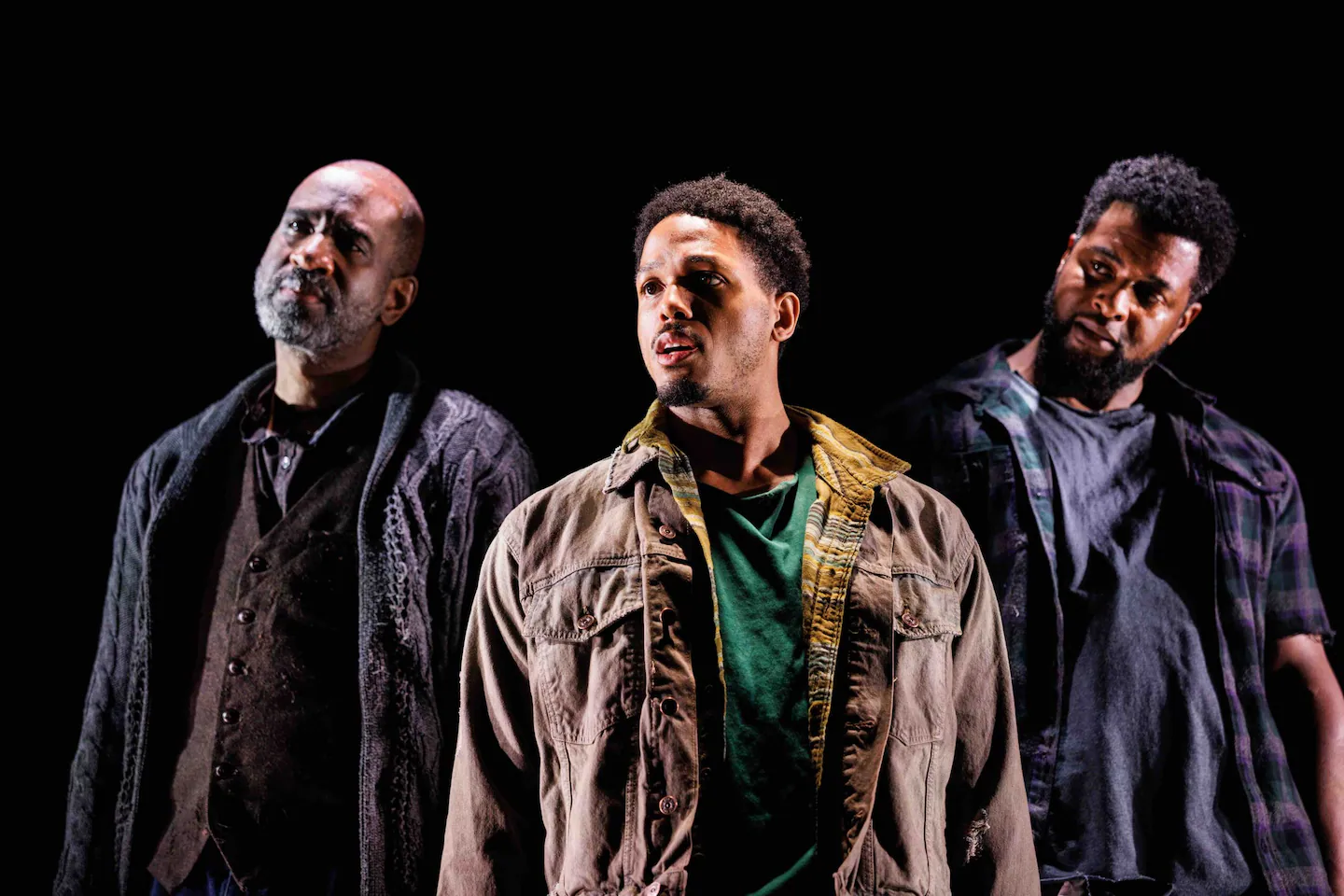
“Hang Time,” which is written and directed by Howard and presented by Arts Emerson, comes to the Paramount Center from Oct. 9-12. The tour is produced by New York’s Flea theater, which originally mounted the play in 2023. The dual meaning of its title offers a stark contrast. The audience listens to these men shoot the breeze and discuss their philosophies, dreams, and regrets, while also looking directly at the excruciating reality of their deaths.
There’s the wise, world-weary Bird (Julian Rozzell), who’s in his 60s; the swaggering and loquacious Slim (Kamal Bolden), who’s in his 40s; and the younger Blood (Bryce Foley), who’s in his 20s and just coming into his own. “We get to bear witness to them cracking jokes and sharing stories. We get to be with them for a brief and intimate time, and I think we come to really care for these men,” Howard says.
The concept for the play first came to Howard in 2020 as the nation was engulfed in that summer’s racial reckoning after the killings of George Floyd, Breonna Taylor, and Ahmaud Arbery. While scrolling through her news feed at the time, Howard noticed stories about two Black men, Robert Fuller and Malcolm Harsch, who both died by hangings (including one in a public park) in Southern California a couple of weeks apart. The deaths provoked a firestorm of outrage toward law enforcement, with the families casting doubt after both deaths were ruled to be suicides and demanding that authorities do full investigations and complete autopsies. The original ruling in both deaths was eventually confirmed.
“There was not a lot of follow-up or investigation [by media outlets] into what happened. And that troubled me and stayed with me for a while … and I started thinking about those men a lot and the lives they might’ve lived.”
Howard remembers reading the early articles about Fuller and Harsch’s deaths, each just a few paragraphs long. “That is the record of a person’s life, and that bothered me,” she says. “And there’s a history of that — just brief little notices. Who was this man? Who cared for him? Who loved him? What did he dream about? These things are flattened.”
In “Hang Time,” Howard gives her characters dimension. The jokes and zingers fly fast and furious. When Slim brags about how his sweet singing voice attracts the ladies, Blood retorts that it “must’ve been that voice … cause it damn sure wasn’t them looks!” They spar over the choice between caring for your family, community, and the greater good vs. single-mindedly pursuing your own ambitions and dreams.
“So much of my inspiration was just being a Black girl growing up in a Black household in Harlem and listening to my father, my brother, my uncle, my cousins, and godfathers — how they talk intimately with one another,” she says. “But it’s not just the men in my life, the men I’ve known. There’s a lot of me in each of these men, depending on the day.”
Each character grapples with the psychic pain and emotional wounds that have left them scarred. Blood grew up in an impoverished household with an absent father who left his family to pursue his wanderlust, while his mother worked herself to the bone. Slim reveals the harrowing years he spent incarcerated. The curmudgeonly Bird hints at an aching sadness as he wistfully talks about losing a woman he loved. “We have to appreciate them living to actually mourn their deaths,” Howard says.
With the three actors in fixed positions suspended in the air, the creative team “had to establish a vocabulary of movements,” based on many historical sources that documented lynchings, including books, photographs, and written accounts. “Everything from eye movements to neck movements to mouth movements to lips,” Bolden says. “Zora has very specifically spent hours with us to make sure that that suspension of disbelief gets disrupted.”
Still, Bolden adds, “These men exist outside of [this violent act]. They are not their situation. They’re not the violence that was acted upon them.”
Howard’s plays tend to be multilayered. As they progress, they offer new and deeper dimensions. Her searing new play “Bust,” which premiered last spring in Chicago, begins with righteous rage at an incident of police violence, before it genre-hops into magic realism with characters portal-ing to an alternate realm. Her Pulitzer Prize-nominated play, “Stew,” seen at Gloucester Stage in 2023, appears at first to be a cacophonous kitchen-sink comedy, then transforms into a domestic drama about hidden secrets and betrayals, before revealing itself to have other existential, cosmic ingredients in its simmering pot.
Indeed, as a kid, Howard loved to devour potboiler whodunnits, which she credits with shaping aspects of her writing and her thirst for the unexpected. “I got so emotionally invested in the mystery,” she recalls. “I relished in that as a young person — when they took you on a ride and you were surprised by all the layers, and you didn’t see this thing coming, but then when you have the full context, you see it. So now as a writer, that’s the kind of feeling and environment I want to create for those who encounter my work.”
With “Hang Time,” the other layer is the cosmic, liminal space these characters occupy. The play alludes to the wider systemic racism and violence experienced by Black men — of police brutality, a for-profit prison system that disproportionately locks them up, the low wages and lack of opportunity in minority communities, an inequitable health care system.
“This violence, this injustice, it is ever-present being a Black American,” Howard says. “But we’re all complicit. Even with it right in our face, it’s very easy to see something else, to see part of it, or see it but also not see it. We all participate in that ritual. And then sometimes there’s something so horrific, so atrocious that arrests us, that holds our attention, that guts us for a moment. But then we forget.”
It’s “fleeting,” Howard adds. “I mean, wouldn’t you prefer just the banter? Isn’t it easier just to be entertained?”
Ultimately, she hopes audiences “interrogate” their reactions to what they can’t look away from. “Watching this play, what do we, as the individual and the collective, choose to confront and what do we choose to put away? And at what cost?”
HANG TIME



